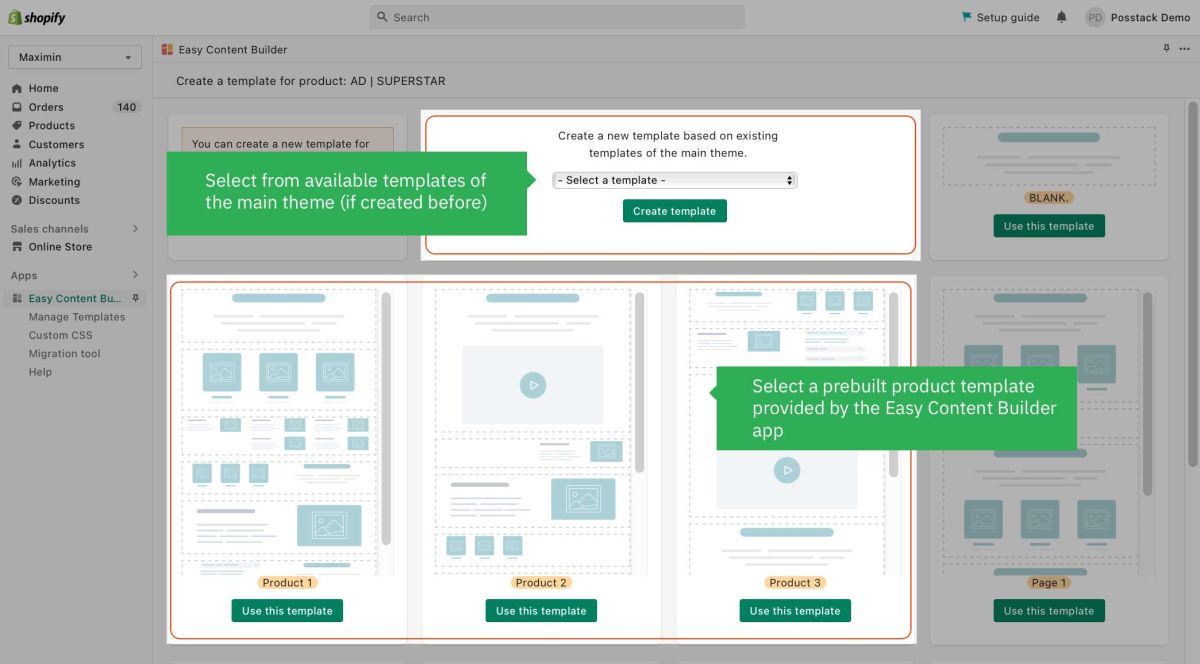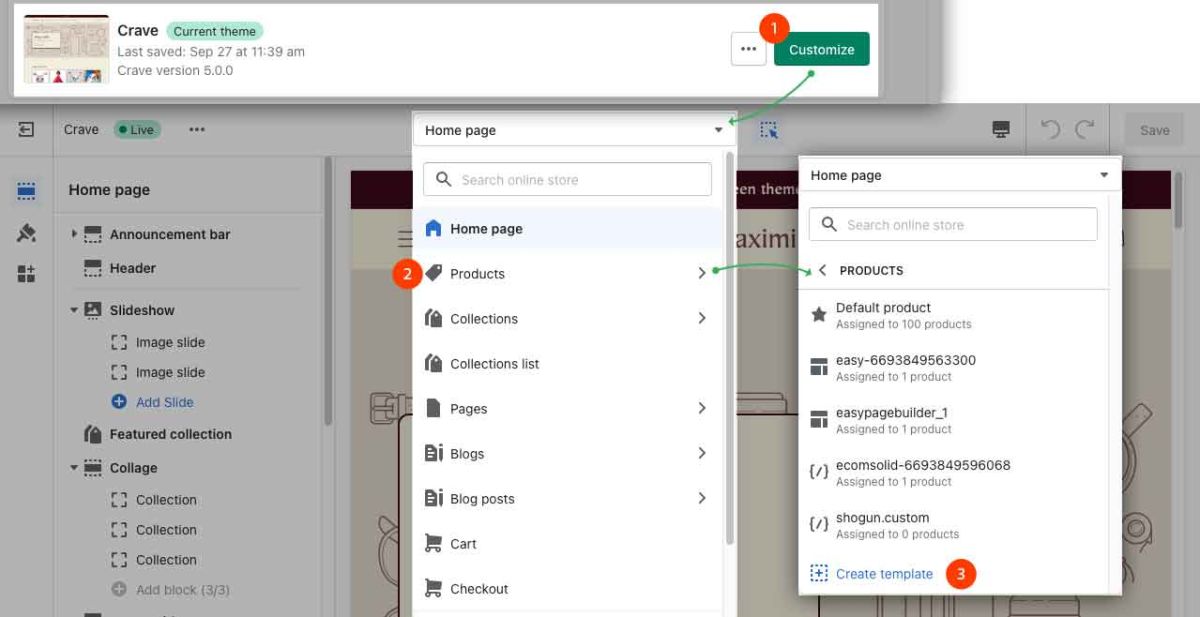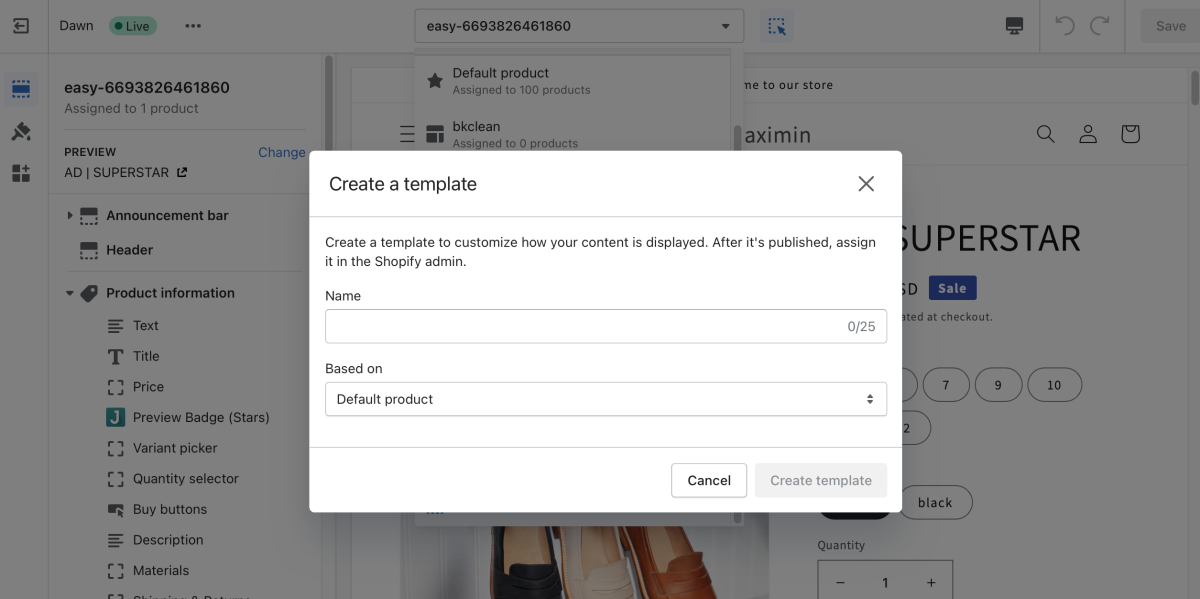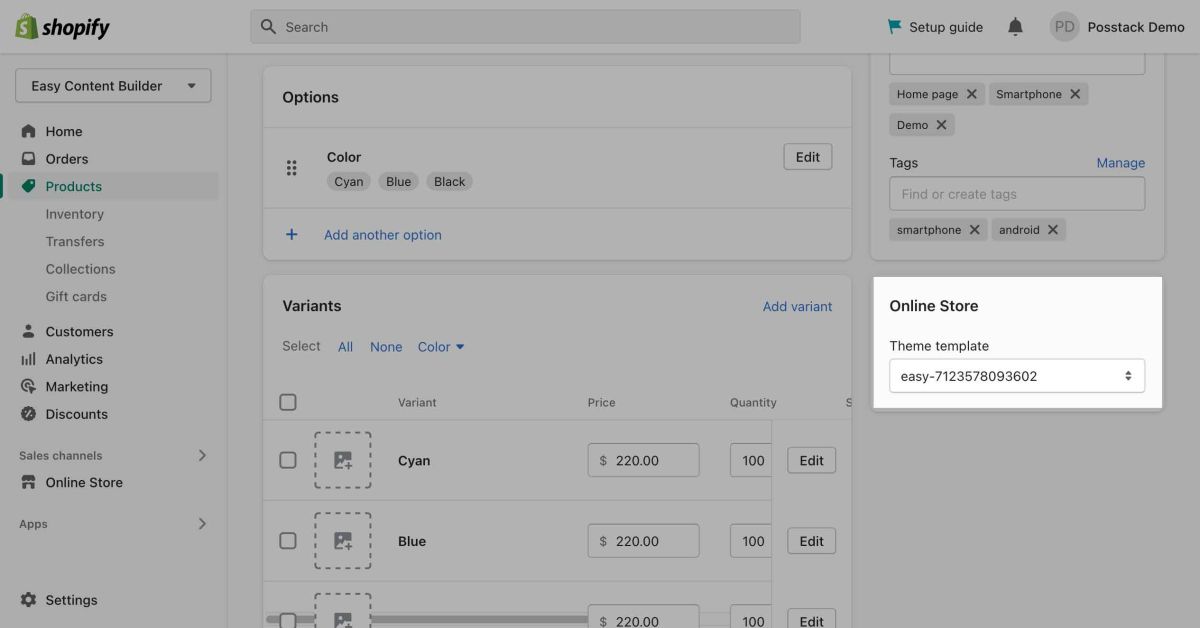Create Product Templates: Difference between revisions
No edit summary |
|||
| Line 1: | Line 1: | ||
You can easily create a unique individual template for each of your products that presents specialized information and rich content blocks. | You can easily create a unique individual template for each of your products that presents specialized information and rich content blocks. When creating a product template using the Easy Content Builder, your original product page URL remains unchanged. | ||
When creating a product template using the Easy Content Builder, your original product page URL remains unchanged. | |||
In this section, you will learn: | In this section, you will learn: | ||
| Line 34: | Line 32: | ||
== Create a new template for a group of products == | == Create a new template for a group of products == | ||
===== Step 2 | ==== Step 1: Open the Theme Editor ==== | ||
* From the Shopify admin, go to Online Store > Themes. Find the theme that you want to edit, and then click '''Customize'''. | |||
* Alternatively, from your Shopify admin, go to Apps > '''Easy Content Builder'''. From the Easy Content Builder dashboard, click '''Manage Templates''', find the template you want to edit, and then click '''Customize'''. | |||
==== Step 2: Create a template ==== | |||
* From the dropdown menu in the Theme Editor, click '''Products''', then scroll down and click '''Create''' '''template'''. | |||
* From the dropdown menu in the Theme Editor, click '''Products''', then scroll down and click '''Create''' template. | |||
: [[File:Create Clean template.jpg|1200px]] | : [[File:Create Clean template.jpg|1200px]] | ||
* From the Theme Editor, you can start adding content blocks to the template you’ve just created.</p> | |||
* The fill in the '''Name''' & the '''''Based on''''' fields as follows: [[File:Create clean template base.png|1200x1200px]] | |||
* '''Name''': type the name using the following name structure, where “easy-“ is the prefix. The name can contain any of the following characters: (a-z), (0-9), and dash. E.g: easy-collection-phone | |||
Note: When migrating templates to a new theme, the ECB app only migrates the templates with the name structure above. | |||
* '''Based on''': Select Default template or any available template created before. | |||
From the Theme Editor, you can start adding content blocks to the template you’ve just created.</p> | |||
==== Step 3: Assign a template to the product you've just created. ==== | ==== Step 3: Assign a template to the product you've just created. ==== | ||
Revision as of 17:22, 2 December 2022
You can easily create a unique individual template for each of your products that presents specialized information and rich content blocks. When creating a product template using the Easy Content Builder, your original product page URL remains unchanged.
In this section, you will learn:
Create a new template for a Single product with the ECB app
NOTE: We highly recommend you create three Clean templates first, each for a type of page - Product page, Webpage, and Blog Post page. Once created, you will have three Clean template files with the .clean suffix (product.clean.json, page.clean.json, article.clean.json).
Learn more about What a Clean template is and How to create a Clean template.
Step 1: Create a new product:
- From your Shopify admin, go to Products.
- From the Products page, click Add product.
- Enter a title for your product, along with additional details.
- Click Save.
Note: If you want to create a template for an existing product, simply go to your Shopify admin > Products > click the name of the product that you want, then follow Step 2 below.
Step 2: Create a template for the product
- From the Product Edit page, click More actions (that appears in the upper-right of the form), click Create Template for this product:
- From Easy Content Builder dashboard, you can create a new template based on:
- Select a prebuilt product template provided by the Easy Content Builder app. Or,
- Select from available templates of the main theme (if created before): This option is only visible if you did build templates using the Easy Content Builder app before. It allows you to speed up the workflow by reusing those templates.
Step 3: Customize the template in the Theme Editor
- After you perform Step 2 above, you will be automatically directed to the Theme Editor where you can start adding content blocks to the template you’ve just created. Please refer to sections Add Sections and Adding ECB Blocks for more details.
Create a new template for a group of products
Step 1: Open the Theme Editor
- From the Shopify admin, go to Online Store > Themes. Find the theme that you want to edit, and then click Customize.
- Alternatively, from your Shopify admin, go to Apps > Easy Content Builder. From the Easy Content Builder dashboard, click Manage Templates, find the template you want to edit, and then click Customize.
Step 2: Create a template
- From the dropdown menu in the Theme Editor, click Products, then scroll down and click Create template.
- Name: type the name using the following name structure, where “easy-“ is the prefix. The name can contain any of the following characters: (a-z), (0-9), and dash. E.g: easy-collection-phone
Note: When migrating templates to a new theme, the ECB app only migrates the templates with the name structure above.
- Based on: Select Default template or any available template created before.
From the Theme Editor, you can start adding content blocks to the template you’ve just created.
Step 3: Assign a template to the product you've just created.
If you complete Step 3.1 Create a product template with prebuilt Easy Content Builder templates, the app automatically assigns the template you've created to the selected product.
When you want to manually assign available templates to a product, you can follow these steps:
- Go to the Shopify admin > Products, open the product you want and assign the template you’ve created (under the Theme Template section).
Next Step:
Once the new Product template is in place, you can start adding content blocks (Please refer to the section Add Sections and ECB Block Settings for more details)





